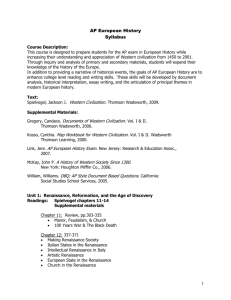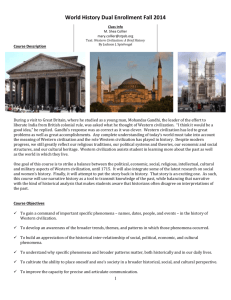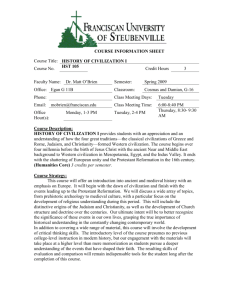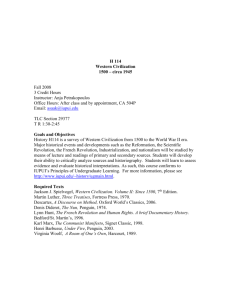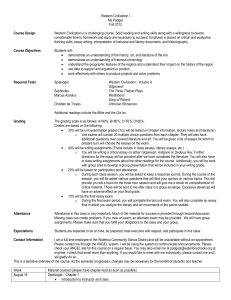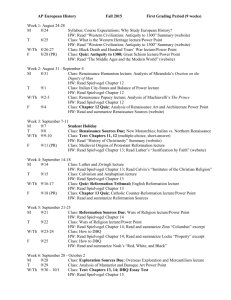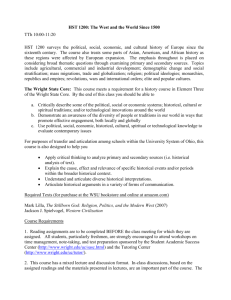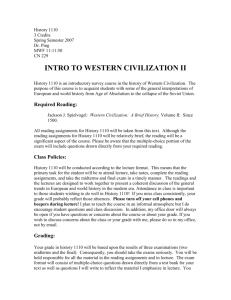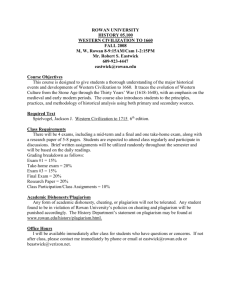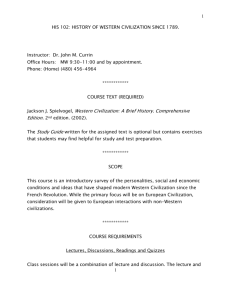8734
advertisement
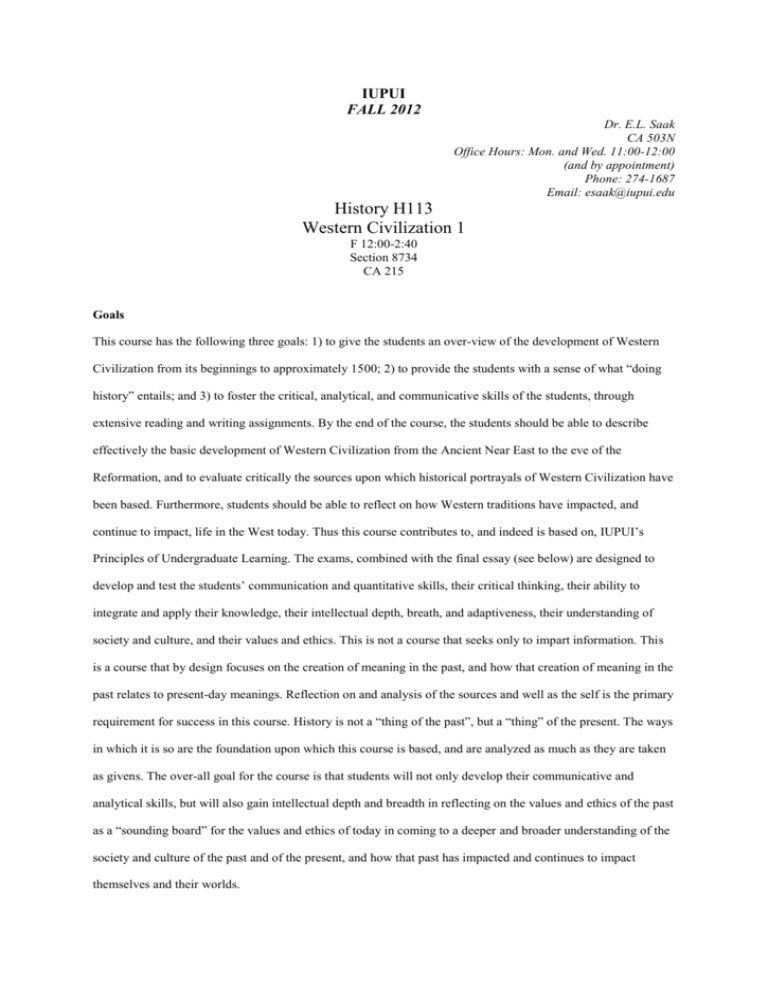
IUPUI FALL 2012 Dr. E.L. Saak CA 503N Office Hours: Mon. and Wed. 11:00-12:00 (and by appointment) Phone: 274-1687 Email: esaak@iupui.edu History H113 Western Civilization 1 F 12:00-2:40 Section 8734 CA 215 Goals This course has the following three goals: 1) to give the students an over-view of the development of Western Civilization from its beginnings to approximately 1500; 2) to provide the students with a sense of what “doing history” entails; and 3) to foster the critical, analytical, and communicative skills of the students, through extensive reading and writing assignments. By the end of the course, the students should be able to describe effectively the basic development of Western Civilization from the Ancient Near East to the eve of the Reformation, and to evaluate critically the sources upon which historical portrayals of Western Civilization have been based. Furthermore, students should be able to reflect on how Western traditions have impacted, and continue to impact, life in the West today. Thus this course contributes to, and indeed is based on, IUPUI’s Principles of Undergraduate Learning. The exams, combined with the final essay (see below) are designed to develop and test the students’ communication and quantitative skills, their critical thinking, their ability to integrate and apply their knowledge, their intellectual depth, breath, and adaptiveness, their understanding of society and culture, and their values and ethics. This is not a course that seeks only to impart information. This is a course that by design focuses on the creation of meaning in the past, and how that creation of meaning in the past relates to present-day meanings. Reflection on and analysis of the sources and well as the self is the primary requirement for success in this course. History is not a “thing of the past”, but a “thing” of the present. The ways in which it is so are the foundation upon which this course is based, and are analyzed as much as they are taken as givens. The over-all goal for the course is that students will not only develop their communicative and analytical skills, but will also gain intellectual depth and breadth in reflecting on the values and ethics of the past as a “sounding board” for the values and ethics of today in coming to a deeper and broader understanding of the society and culture of the past and of the present, and how that past has impacted and continues to impact themselves and their worlds. 2 Required Texts Jackson Spielvogel, Western Civilization, vol. A: To 1500. 8th edition. Boston, 2012. Plato, The Republic. Oxford, 2008. Virgil, The Aeneid, trans. Robert Fagles. New York, 2006. Augustine, Confessions, trans. Henry Chadwick. Oxford, 1992 Grading The final grade will be given based on the following percentages: 1.) Midterm Exam: 100 points 2.) Final Exam: 100 points 3.) Term Paper: 100 points Total: 300 points . The midterm and final exams will consist of twenty-five multiple choice questions (25 points); five short answer questions (5 points each; 25 points) and one essay question (50 points), covering the text book, the lectures, and the readings. Study guides for the exams will be distributed in due course. The term paper is to be based on a selected primary source to be approved by the instructor. A guide to the term paper will be distributed separately. Oncourse This course uses Oncourse for much of its administration. If you do not know how to use oncourse, you are strongly urged to contact the University Information Technology Services to learn how, and please notify me as well. Attendance I expect each and every student to attend each and every lecture. More than three absences will result in a loss of 10 points; more than six absences will result in a loss of an additional 20 points. Excused absences must be cleared with me. Only the most extraordinary of circumstances will excuse more than three absences. 3 Policy on Cheating Please note that I will not tolerate cheating, and will punish any student caught cheating with the full severity allowed me by IUPUI regulations, which could include being suspended permanently from the course and automatically assigned an ‘F’ as a final grade, as well as further disciplinary measures. Please refer to the IUPUI handbook for Student Conduct. I view cheating any of the following: 1) Plagiarism of any kind, by which I mean: copying all or part of another student’s paper; handing in papers written for you by someone else; failure to properly footnote direct quotations, paraphrased passages, or opinions of other scholars (including authors of Cliff Notes and other such study aids) in essays written outside of class. Plagiarism also consists of using material from the WWW without using quotation marks and proper citation. Plagiarism is easy to detect. Do not do it! If you have any questions whether you are plagiarizing material, please ask me about it before hand! Once a paper is turned in, it is too late and the paper, if plagiarized, is subject to the penalties mentioned above; 2) collaborating on any in-class exam; 3) copying the answers of any other student during an in-class exam In short, DO NOT CHEAT AND DO NOT PLAGIARISE! YOU WILL BE CAUGHT AND PUNISHED! 4 Schedule of Lectures Week 1 F Aug. 24: Beginnings: Introducdtion and Ancient Mesopotamia Readings: Spielvogel, Western Civilization, Preface, Introduction, and ch. 1-2 (herafter cited as Spielvolgel) Week 2 F Aug. 31: The World of the Greeks Readings: Spielvogel, chs. 3-4; Plato, Republic Week 3 F Sept. 7: The Myth of Rome Readings: Spielvogel, chs. 5-6; Virgil’s Aeneid Week 4 F Sept. 14: The Rise of Christianity and the Christianization of Rome Week 5 F Sept. 21: Augustine of Hippo Readings: Augustine, Confessions Week 6 F Sept. 28: The Fall of Rome and the Emergence of Christendom Readings: Spielvogel, ch. 7 Week 7 F Oct. 5: The World of Charlemagne Readings: Spielvogel, ch. 8 Week 8 F Oct. 12: Mid-Term Examination Week 9 F Oct. 19: Basic Structures of Christendom Week 10 F Oct. 26: The Age of Reforms Readings: Spielvogel, ch. 10 Week 11 F Nov. 2: Renaissance and Renewal: The High Middle Ages Reading: Spielvogel ch. 9 5 Week 12 F Nov. 9: Who Ruled Europe? The Crisis of Power Week 13 F Nov. 16: The Crisis of the Later Middle Ages Readings: Spielvogel, ch, 11 Week 14 F Nov. 23: Thanksgiving—No Class Week 15 F Nov. 30: Renaissance, Reformation, and the Crumbling of Christendom Reading: Spielvogel, ch. 12 Week 16 F Dec. 7: So What? FINAL EXAM: Friday, December 14, 1:00 P.M.-3:00 A.M
